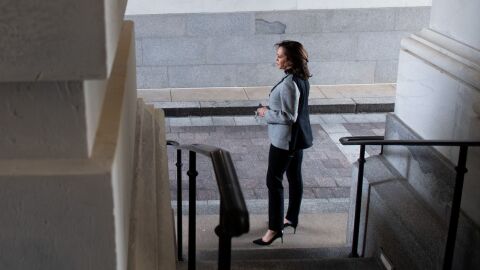When Sen. Kamala Harris (D-Calif.) accepts the Democratic vice presidential nomination Wednesday night, she becomes the first graduate of a historically Black college or university (HBCU) to join a major party ticket. That's a point of pride for many HBCUs, their students and alumni.
Ohio's two HBCUs are located opposite each other in Wilberforce. Wilberforce University lays claim as the nation's oldest private historically black university, while Central State University was a former division that split off and became a public school.
Sandi Lynn, a 1968 graduate of Central State University, is excited to see a fellow HBCU graduate on the Democratic ticket.
"I'll be eagerly glued to the screen," Lynn says when asked if she'll watch Harris' acceptance speech. "Not only are we historically Black institutions of which Kamala Harris has come from, but we are in a historic moment in time and I would not want to miss it."
Harris earned her undergraduate degree from Howard University, a private HBCU founded in 1867 in Washington D.C. She returned in 2017 to speak at commencement.
"First, to lead and to thrive, you must reject false choices. Howard taught me, as it has taught you, that you can do anything and you can do everything," she said.
As NPR reports, Haris credits Howard with shaping her political future.
Howard University was one of Harris' first stops when she announced that she would run for president. She faced reporters as a candidate for the first time on campus.
Standing behind a lectern before a throng of journalists and cameras, Harris called the institution "one of the most important aspects of my life."
"It is where I first ran for my first elected office, which was freshman class representative of the Liberal Arts Student Council, so this is where it all began," Harris said.
Wilberforce University President Elfred Anthony Pinkard is also a Howard University graduate, earning his masters and doctorate degrees there. He attended Morehouse College, another HBCU, and has worked at a handful of HBCU institutions. He says such success stories are not new "but it's wonderful to have this spotlight."
"HBCUs have always sort of occupied the margins and people have always misunderstood these institutions," Pinkard says. "They've never have been given the kind of focus that they deserve although they have produced in the 100-plus years that they've existed incredibly luminous alums. It's just nice to have HBCUs now be a part of the conversation when one talks about colleges and universities in American and the choices that students have."
Pinkard says there's a reawakening going on. He points to increased philanthropic giving to HBCUs, high profile athletes wearing HBCU garb and a general heightened awareness and opportunities for celebration and affirmation. Having this spotlight could lead to more philanthropy, investments and recruiting.
There are roughly 107 HBCUs in the United States and many have struggled financially, Pinkard points out, because of uneven resources and funding and general public awareness. The first HBCUs were formed in the 1800s when African Americans were denied access to higher education.
"People are now becoming aware of these institutions and what they have historically meant to this nation and to the world," Pinkard says. "These are institutions that are not just for African Americans. These are national institutions and the alums of these institutions have gone on to make an imprint on the world and that's just not generally known and now it can be, and I think that's just exciting and fair."
Pinkard says Wilberforce and other schools are expecting a sea change moving forward. He calls this an inflection point, "and it's occurring at a time when a lot of conversation is being had about racial inequality and social injustice."
For Sandi Lynn, this moment is a point of pride.
"I'm thinking that every HBCU grad has to know or has to be reminded that HBCUs are not a second-chance institution," she says. "They are what was formed over a hundred years ago ... when Blacks wanted higher learning but were not accepted in most colleges and universities, so HBUCs to the rescue.
"For HBCUs," Lynn continues, "this is a confirmation that we are capable of higher learning, accomplished, and ready to come out and perform in the world."
Lynn also likes that Harris shows Black women and girls - and Asian-American women and girls - that they can accomplish great things.
"She shows it's not a sprint and it's not even a marathon. It's a relay where she'll be passing the baton to them next," Lynn says. "So, that inspires people and I'm happy about that. It's just another great moment that shows we're opening doors and shattering glass ceilings."
Copyright 2021 91.7 WVXU. To see more, visit 91.7 WVXU. 9(MDA5NTM4MTIyMDE0MTg3NDc2MTVlZjdmNQ001))





